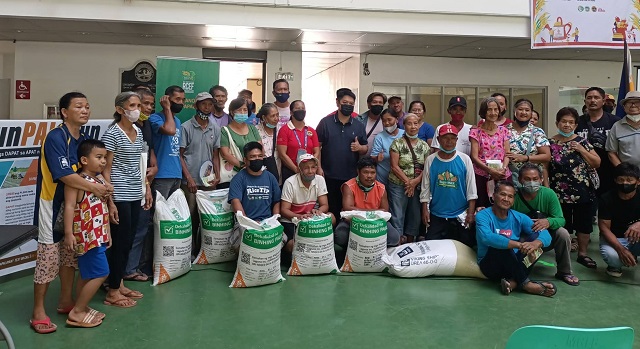
The Department of Agriculture – Philippine Rice Research Institute (DA-PhilRice) is now ready to distribute 4.27 million bags (20kg/bag) of certified inbred rice seeds, expanding its program coverage from 42 to 77 provinces within all rice-producing regions in the country.
Jointly funded by the Rice Competitiveness Enhancement Fund (RCEF) Seed Program and the DA’s National Rice Program (NRP) with P3 billion and P700 million, respectively, the certified inbred rice seed distribution is intended to complement and supplement the hybrid rice production strategy of Pres. Ferdinand Marcos Jr. under his food security agenda.
Dr. Flordeliza Bordey, director of the RCEF Program Management Office at DA-PhilRice, said that the allocation can plant 1.97 million hectares in 1,319 cities and municipalities nationwide this 2023 wet – 2024 dry cropping season. Batanes, Basilan, Tawi-tawi, and Sulu are not included due to limited rice areas.
“Through the integrated efforts of RCEF Seed Program and the DA-NRP’s inbred seed strategy, we are expecting to serve 1.69 million farmers starting March 16. DA-PhilRice will handle the planning, acquisition, and delivery of the certified seeds in coordination with the DA Regional Field Offices, while the provincial, city, and municipal local government units (C/MLGUs) will help in dispensing the seeds to the farmers,” she said.
Previously, the RCEF Seed Program has distributed more than 11.7 million bags of certified inbred seeds in 42 provinces since its first implementation in 2020 dry season. Results of the seasonal monitoring and evaluation of the program showed that adoption of certified inbred seeds in its covered provinces doubled from more than 40% to 84% leading to increased average yields.
“Farmers’ experience in continuous use of certified inbred seed has somehow prepared them to also adopt hybrid seeds in production,” Bordey said.
Meanwhile, the inbred rice varieties to be distributed were selected based on their adaptability to the local conditions and resistance to insect pest and disease outbreaks.
These inbred varieties include NSIC Rc 222, Rc 402, and Rc 480, which are popular owing to high yield performance, and NSIC Rc 216, Rc 160, and Rc 218, which are preferred for good eating quality. Varieties that are adaptable to less favorable environments, including drought-prone areas are also allotted for specific locations.
Next generation varieties such as NSIC Rc 506, Rc 508, Rc 512, and Rc 534 that have comparable yields with hybrids are also being introduced through RCEF.
Harvests from NSIC Rc 506 ranged 7-8.6t/ha in RCEF PalaySikatan technology demonstration areas including La Union, Albay, Sorsogon, Zamboanga Sibugay, Zamboanga del Sur, Lanao del Norte, Davao del Sur, Davao del Norte, Davao de Oro, South Cotabato, and Agusan del Norte. Across all sites, it has an average yield of 7.76t/ha during the 2022 dry and wet cropping seasons.
Dr. John de Leon, executive director of DA-PhilRice said these varieties, which also underwent participatory selection among farmers, are beneficial to the rice producers and the industry.
“Through our modern breeding processes, these next-generation inbred varieties manifest in part so-called genetic gain in terms of local yield improvement over time. This is evidenced for example by the increasing palay production in the Philippines from 12.4 million metric tons (MT) in 2000 to 19.96 million MT in 2021. If farmers continue to adopt certified seeds of the newly-developed inbred varieties, they can expect their yields to improve further,” de Leon explained.
The certified inbred seeds that will be distributed to qualified beneficiaries were sourced from local seed growers cooperatives and associations (SGC/As) engaged by the RCEF Seed Program. From 47, the program now partners with 64 SGC/As whose membership reach more than 3,400 seed growers.
The Bureau of Plant Industry – National Seed Quality Control Services leads in strict field inspection and laboratory analysis to ensure that the seeds produced by the SGC/As pass the prescribed quality standards.
To further enhance processes and stakeholders’ experiences, DA-PhilRice is also maximizing the use of mobile and digital applications in seed positioning, delivery, and distribution.
“Through these efforts, we hope to minimize farmers’ woes by ensuring that they receive the certified seeds in time for their planting schedules,” Bordey said.
Meanwhile, the management offices of RCEF Seed Program and DA-NRP clarified that the guidelines of the certified inbred seed distribution have been updated.
List of qualified beneficiaries and their rice areas will be fully based on the Farmers and Fisherfolks Registry System (FFRS), which is the encoded version of the Registry System for Basic Sectors in Agriculture (RSBSA).
Authorized representatives are allowed for farmers who are sick, senior citizens, pregnant, OFW, or those with differentiated ability, or deprived of liberty. Individual representatives are permitted to proxy one beneficiary. They must bring an authorization letter, their valid ID and that of the farmer being represented.
Members of farmers’ cooperatives and associations (FCA) can also authorize a representative, as documented in an FCA resolution signed by requesting farmer-members. They must also bring a photocopy of their valid IDs.
The RCEF ID or the DA Interventions Monitoring Card that were previously provided can also serve as farmers’ identification. Those who are FFRS-registered but do not have these can present other valid IDs and their RSBSA stub.
DA-PhilRice encourages farmers to coordinate with the LGUS for more information about the guidelines of the certified inbred seed distribution in their localities.
To further support farmers’ productivity, the DA-PhilRice through its RCEF Seed and Extension Programs will also cascade to select LGUs the results of the massive soil analysis of farmers’ fields through the use of the Minus-One Element Technique (MOET) kit and MOET Mobile Application.
“The processed information shows the macro and micro nutrient deficiencies by soil type in each municipality and the site-specific fertilizer recommendations. We hope that these can help local farmers maximize their resources amid high fertilizer costs,” Bordey said.
The RCEF Seed Program is a component of Republic Act 11203 or Rice Tariffication Law, which allocates P3 billion fund every year to develop, propagate and promote high-quality inbred rice seeds to help improve the competitiveness of the Filipino rice farmers.




